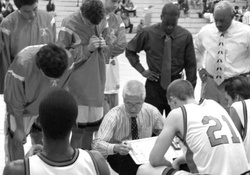Since 1977, Doug Kagawa has worked as head coach of varsity basketball at Albany High School in Albany, CA. In speaking with him, I learned a high school coach is motivated by the sport, the students, and the constant quest to create the chemistry that makes a winning team.
Kagawa began playing in the “C” level basketball league in sixth grade, although officially he wasn’t supposed to start until seventh grade. He played basketball all the way through school and played baseball with the [Japanese American] Berkeley Bears. As a kid, he also helped his father coach his younger brother in Little League baseball and basketball.
“My dad is a photographer, but he probably would have been a really good high school football coach until he went into the internment camps, which kind of messed up his career,” Kagawa recalls. “He was an athlete.”
Second to his father, his high school basketball coach helped launch him on his path towards sports. “I never played school ball, but he refereed the Japanese [league] games and so he would see me play, and finally he told me to try out for the high school team. So I tried out my junior year at Berkeley High School and I made the team and it kind of started my career. When I graduated I came back and coached with him.
“What I tell students is coaching is like being a chef and players are all the different ingredients. The chef has to kind of blend the players together as best you can and come up with a finished product. Sometimes the product rises to the top, and sometimes it just… percolates. I think my style of coaching is very flexible. I don’t have one set style and everybody has to accommodate my style. What I try to do is take an evaluation of what kind of players I have for each season and to try to develop ways to take advantage of each different team’s strengths and weaknesses. So I run all different kinds of set offenses and defenses.”
One of the most important qualities he practices as a coach is restraint.
“The kind of style I would prefer to play would be the really up-tempo running game and full court press. My role models of coaching would be people like John Wooden, where you play real fundamental basketball and you don’t do all the talking and showboating. If you notice the coach on the court more than the players, then something’s wrong. The game is for the players, the coach is just to facilitate and be a coach and not be a pain. So I try to be low-key on the court because if I expect my players to make critical decisions in stressful situations I can’t be going bonkers on the bench.”
A product of the long tradition of JA sports, Kagawa can’t help but make a connection between his Japanese American heritage and his coaching style. “I think it really goes back to the Japanese community.
“To my dad in terms of his work ethic and my mom in terms of supporting the family. In terms of work ethic, you learn it from your parents: Whatever you do you want to do it 100 percent. You never quit, you never give up, and you could be down by 30 or up by 30 but you always give it 100 percent until the final buzzer. The Japanese leagues have exploded. I remember when I used to play and we used to get really excited for one tournament down in Los Angeles, but now there’s like one every weekend.”
That old-fashioned demand for respect in sports makes Kagawa a stickler for detail: the players’ appearance, the way they treat each other on the court. “Even before the rule was brought in that you had to keep your shirttail in, guys would try to play with their jersey tail out and I would say ‘No, you tuck your shirttail in.’ They came sagging and I would say ‘No, I don’t care what the style is, and you don’t sag’. A lot of sports unfortunately are becoming who can outdo each other individually rather than the team emphasis. My basic rule is that you never talk on the court other then talking on defense or complimenting your own teammates. I have a rule that if you get an assist from a player, you had better acknowledge the passer so I can see that you respect the pass, otherwise you are coming out of the game.
“I’ve kept some players that other coaches would have cut because of behavior, but I think I am a teacher first and a coach second, and I believe that sports could show kids a different way to behave. By having a good group of people around, that person could learn a lot.”
For Kagawa, a champion isn’t defined by points scored on the court but by how an athlete accomplishes the game of life. “I think being a successful person has the same attributes and characteristics as being a champion or a winner. A champion in my picture is not judged on your win-loss record. For me, a champion person is a quality person. We had a team one year ago; we were 0-14 in our league. We got blitzed by 30 points regularly each game. But that team, no one ever quit and all nine seniors went on to a four-year college. In my eyes, we did everything we could, and that was a championship season.”
His personal formula for winning is simple. “My philosophy with all of my players and students is: family comes first, school is second, and sports activities come after that. Find something that you really enjoy doing, and maybe you can pursue that thing as a career. I never wanted to have to go to work and everyday wake up and not be excited to go to work. I hear too many stories of people who go to work because they have to pay the bills. I love being paid for this job but I would probably do it without being paid. When I wake up in the morning I’m excited to go to work.”
He does have one confession, however. “Right now with coaching and being a head counselor, I don’t have much head time. But if I did have spare time, I would probably try and play golf."
* This article was originally published in Nikkei Heritage Vol. XVIII, Number 2 (Winter 2006), a journal of the National Japanese American Historical Society .
© 2006 National Japanese American Historical Society




